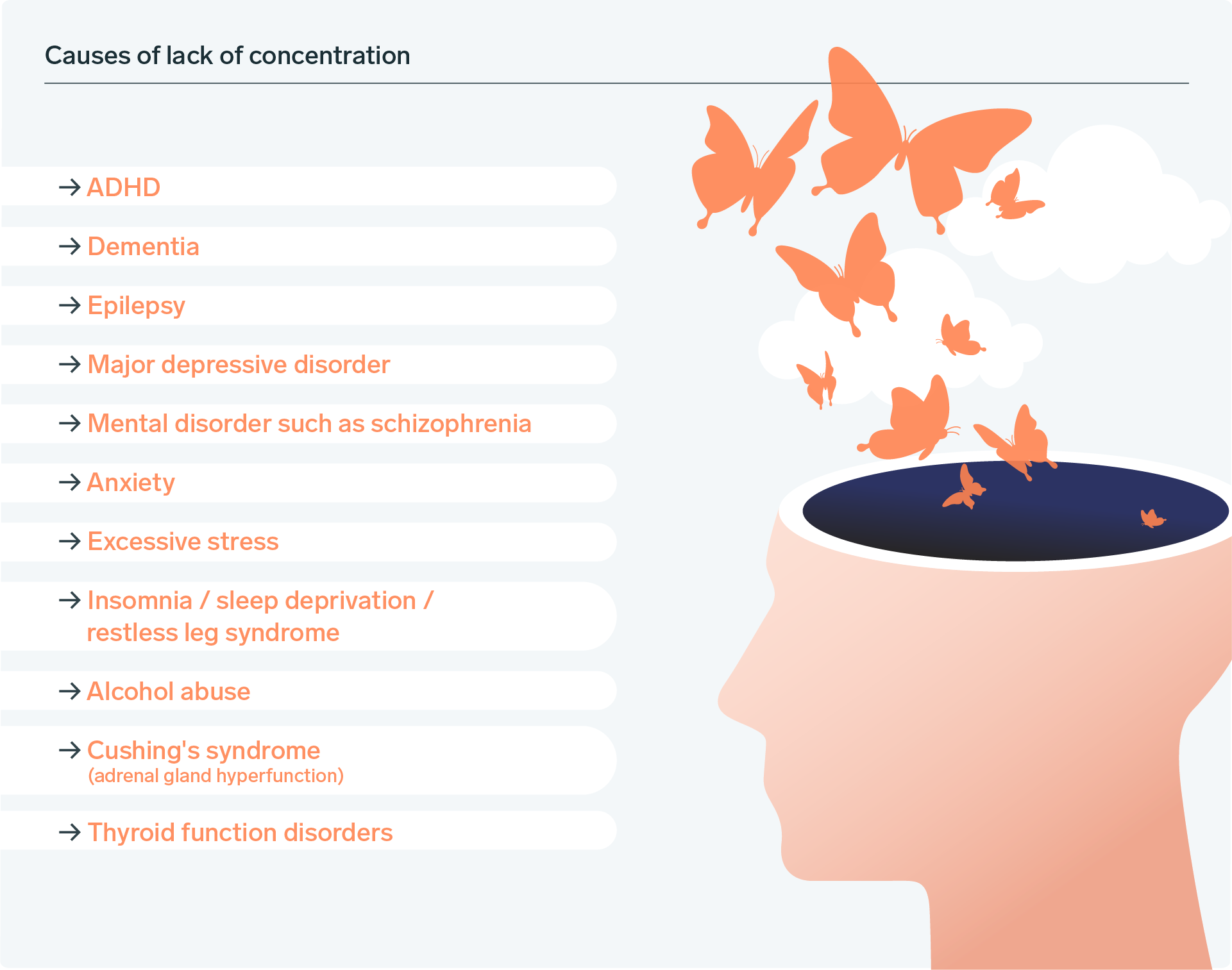Specialist Advice — 14 minutes
Poor concentration: Occasional issue or major disorder?
February 20, 2024

Poor concentration can occur at any age and most often has no particular significance other than relating to normal aging. However, poor concentration can worsen and interfere with performing daily tasks.
As long as it is a sporadic, passing event, there is no cause for concern. But if it continues and is accompanied by other signs and symptoms, it may be time to seek help or adopt strategies to improve your ability to concentrate.

What does our ability to focus depend upon?
Our ability to focus on a task depends primarily on the workings of the “executive functions,” a series of brain activities carried out by the prefrontal cortex. These functions must work in unison for us to concentrate and achieve concrete results. [1]
- Cognitive flexibility – It allows us to move from one task or problem to another, to evaluate more than one hypothesis or the possibility of achieving tasks.
- Cognitive inhibition – It is our ability to block behaviours, reactions or other knowledge not required to perform a given task. In other words, it allows us to avoid distractions of all kinds (visual, sound, mental).
- Working memory – It is our ability to retain at least a certain amount of front-line information necessary to perform our work.
Good mental and physical health, a supportive environment and many other factors also influence our ability to focus on a task. For example, a high level of commitment and motivation makes it easier to perform a task. Conversely, insufficient physical or intellectual ability to perform a complex task, such as reading a difficult text, limits our ability to concentrate. [3]
The CoReCRE association offers short exercises (in French) that help us understand the specifics of the four essential executive functions. [2]
An individual who suffers from poor concentration may exhibit a variety of symptoms, including the following: [4]
- Memory loss
- Difficulty sitting still
- Difficulty thinking clearly
- Losing things
- Inability to make decisions
- Inability to perform complex tasks
- Lack of energy
- Careless mistakes
Causes of poor concentration
Given the vital role of the brain’s executive functions, several causes can affect our ability to concentrate. [5]

Memory and concentration issues can also be side effects of medications such as the following: [6]
- Benzodiazepines
- Some antihistamines
- Some antidepressants
- Some over-the-counter medications, including sleeping pills
When should you see a doctor?
Here are some medical conditions that may accompany poor concentration and require urgent medical attention: [5]
- Loss of consciousness
- Numbness or tingling on one side of the body
- Severe chest pain
- Severe headaches
- Sudden, unexplained memory loss
- Disorientation (not knowing where you are)
Other less severe symptoms you should bring to the attention of a health care professional include the following:
- Memory impairment more pronounced than usual
- Diminished performance at work or school
- Trouble sleeping
- Unusual feelings of fatigue
- Decreased quality of life
Diagnosis and treatment
There are currently no readily available blood tests or imaging techniques to diagnose poor concentration. Therefore, diagnosis is primarily based on analyzing the issues the patient and family members report, followed by eliminating identifiable medical causes.
Many drug therapies are available if the concentration problem is associated with ADHD or results from a treatable physiological condition (thyroid or adrenal gland disorders, sleep disorders, medication adjustment, etc.). In the absence of such conditions, several tips are recommended to help maintain acceptable concentration levels. Here are a few from a list provided by HealthLine: [7]
- Train your brain (Sudoku, crosswords, chess, puzzles, some video games, etc.)
- Get better sleep
- Get regular physical activity
- Spend time in the great outdoors
- Try meditation or mindfulness exercises
- Take frequent breaks
- Listen to music
- Eat healthy food
- Avoid multitasking
- Limit distractions while on task
The good news is that you can train yourself to focus! These few exercises help clear the mind and improve concentration skills. They are good habits at any age, especially at a time when there are countless sources of distraction and stress.
We are here to offer professional support.
We offer services that can help your doctor diagnose conditions affecting concentration and determine the appropriate treatment.
- Diagnosing sleep disorders
- Genetic report to help guide your treatment
- Blood test: TSH level (for the thyroid gland)
Do you have a medical prescription for one of these tests? Make an appointment online or call Biron Health Group’s customer service at 1-833-590-2715.
This revised edition reflects an updated version from the original version on our website. We have incorporated recent facts to offer you current and pertinent information.
Sources6
- DIAMOND, A. «Executive Functions», Annual Review of Psychology, vol. 64, 2013., p. 135-168.
- MARTINEZ, S. «Problèmes de concentration : Quels sont-ils, comment les traiter?», https://www.sebastien-martinez.com/problemes-de-memoire/probleme-de-concentration-traiter/, consulté en ligne le 27 juillet 2022.
- Comité Psychologue.net, «9 raisons du manque de concentration», https://www.psychologue.net/articles/9-raisons-du-manque-de-concentration, consulté en ligne le 27 juillet 2022.
- NALL, R. «What Makes You Unable to Concentrate», https://www.healthline.com/health/unable-to-concentrate, consulté en ligne le 27 juillet 2022.
- TANNENBAUM, C., et coll. «A systematic review of amnestic and non-amnestic mild cognitive impairment induced by anticholinergic, antihistaminic, GABAergic and opioid drugs», Drugs & Aging, vol. 29, no 8, 2012, p. 639-658.
- RAYPOLE, C. «14 Tips to Improve our Concentration», https://www.healthline.com/health/mental-health/how-to-improve-concentration#brain-training, consulté en ligne le 27 juillet 2022.









